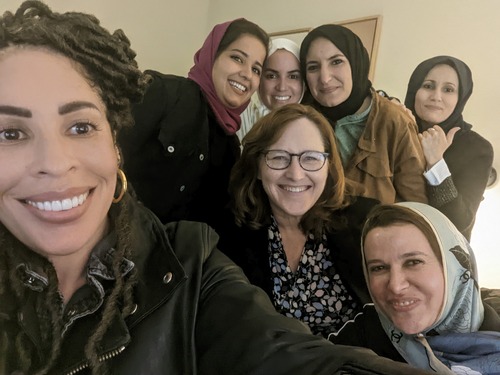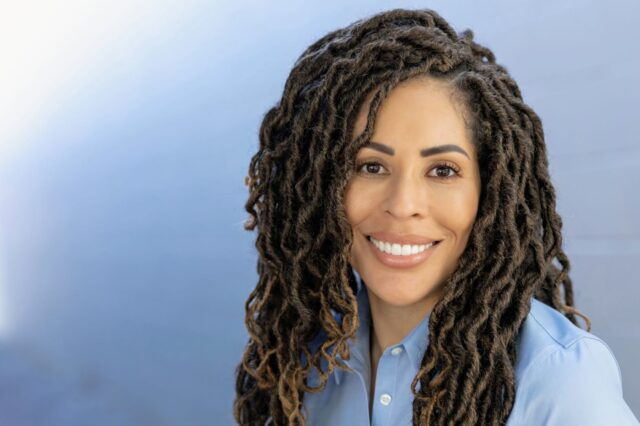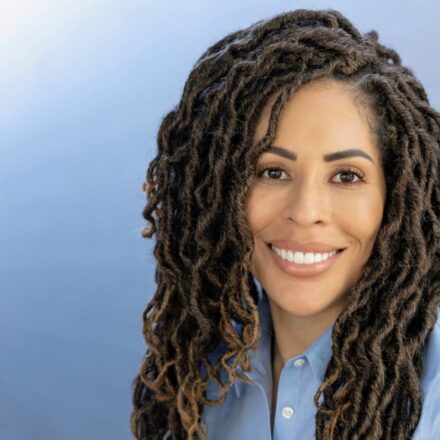“Have you ever thought about what superpower you’d want to have? The ability to fly, super strength, invisibility…I’ve been invisible before, and I have to say, it’s a blessing and a curse.” As a child, Anne-Marie McReynolds had such a severe case of scoliosis she underwent spinal fusion surgery, which required her to use a wheelchair for much of her adolescence. “Oftentimes in a wheelchair, you feel invisible—but I see it as a gift because I became an observer.”
McReynolds’ superpower inspired her to tackle different challenges. “I became a photojournalist because it allowed me to observe and experience the things that interested me most when I could not walk. I became a human factors engineer because I wanted to create robotic prosthetics. And now,” she says, “my work allows me to combine those interests and apply them to innovation on a larger scale.”
Today, McReynolds leverages her experience in human-autonomy teaming, or HAT, to accelerate interaction patterns between humans and technology. According to California State University’s CHAAT program, the goal of HAT is to “create a partnership between humans and machines that is more than just decision support, but rather a true collaboration where both parties share goals, information, and a common language.” Drawing from her photojournalism experience, McReynolds contributed to the development of Google Glass. She has filed 18 patents for innovations in human-AI interaction patterns, including program trustworthiness and customer sentiment scoring. “My passion took me from behind the camera to creating tech that aids in seeing, as well as expanding the definition of cognitive engineering to allow for more equitable user testing.”
Incubating new ideas

As the strategy and operations lead in Dell’s Chief Technology and Innovation Office, McReynolds develops and tests emerging tech for practical applications, working with engineers and other team members to integrate new products into Dell’s existing suite. “[Our team] is usually the first to build out a program using new technology, which we then test to determine whether we can use this new application in existing Dell products,” McReynolds explains. By encouraging in-house engineers to build, develop, and test within expedited timelines, McReynolds’ team can quickly bring solutions to market.
Working closely with Dell ISG CTO Tommi Salli, she helps evaluate potential acquisition and start-up candidates for their partnership readiness. McReynolds is also Co-Chair of the ISG Multicloud & Operating Environments Patent Committee, which handles 10% of all patents.
“As a Black woman in this space, I’m used to working in a vacuum. Not everyone is permitted the same access to these opportunities, so it’s important to nurture new talent and encourage participation.” In 2022, McReynolds joined TechWomen as a professional mentor representing Dell. The organization was founded in 2011 to nurture the development of over 1,000 women in STEM from Africa, Central and South Asia, and the Middle East and offers mentorship, networking, and professional exchange programs to the next generation of tech innovators.
As an Impact Coach for the organization, McReynolds helps young women develop business plans to present to tech industry heavyweights. “It’s incredible to watch an idea grow from conception to full-blown pitch that can ultimately provide solutions for these women’s communities.” Next year, the organization will expand from its base in San Francisco to Chicago, where McReynolds will work virtually with participants to expand visibility for their projects. “My favorite part of this work is seeing their interest and passion for STEM, especially when they can demonstrate their expertise in front of companies like Google and Samsung. It’s a good example of addressing localized needs with innovation and increased access.”
“When it comes to democratizing the workplace, we need to see more types of people engaged in doing the work and participating in technological innovations.” – Anne-Marie McReynolds, strategy and operations lead, Chief Technology and Innovation Office, Dell Technologies
Building equity in innovation

“Even though I no longer use a wheelchair, my experience in this industry still makes me feel invisible sometimes,” McReynolds observes. “Even though I do have that gift of observation in my toolbox, observation does not always necessitate participation—and being Black, being a woman, there are fewer people who look like me in these spaces who can advocate for inclusive environments.” As of 2022, women hold 26.7% of tech jobs, but when accounting for leadership positions, McKinsey reports that just one in 20 C-Suite leaders is a woman of color.
“When it comes to democratizing the workplace, we need to see more types of people engaged in doing the work and participating in technological innovations,” says McReynolds. “Only then will we see the industry expand into universal opportunities that aren’t only available to the elite few.” Dell’s SVP of Global Small Business Erik Day, agrees: “If your goal is to serve all communities, you need to have a range of voices and diversity of thought around the table challenging yours,” he writes. “Otherwise, you’re going to be much less likely to attract an audience that’s diverse and inclusive.”
Inclusion also matters when building solutions; McReynolds’ work with human-autonomy teaming requires that her teams examine engineering bias. “Just because you have access to more data or greater strength of technology doesn’t mean you have quality data,” she explains. “Bias hasn’t gone away with the internet—in fact, we are more open to misinformation and skewed perspectives than ever.” By carefully vetting the data that’s used when building future tech, like generative AI, as well as considering a wide range of perspectives, organizations can further tech accuracy and create innovative product solutions that will have greater impact across communities.
It’s up to organizations to establish responsible practices when implementing emerging tech like GenAI. A human touch—including advocacy for inclusive environments, increased access to opportunities, and acknowledging invisibility in tech spaces—is needed to guide innovation toward results that can be applied in every room.
McReynolds is reminded of a TechWomen cohort member she mentored in a 2022 session; Algerian software engineer Isra Goumiri, who was working on expanding accessibility to e-learning technology and applying compassion-driven thinking towards creating youth-directed experiences. Goumiri researched child-computer interaction and used AI to blend physical and web interfaces that are common in early childhood, merging her perspective with data to uplift the experience and interfaces of existing play applications. “TechWomen and Dell are both committed to expanding STEM opportunities for women world-wide. These fresh applications of technology are important to surface and nurture to show that innovation can happen on any level.”
Innovators at Work is a series on Perspectives profiling Dell team members who drive innovation by combining ideas and technology to create life-shaping impact. The series is inspired by Dell’s Innovation Index, which provides insight on what global decision makers are doing to create innovation resilience in turbulent times.

